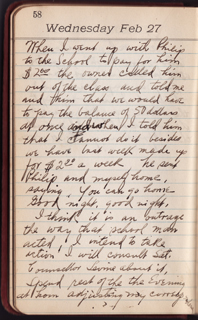
Visited Sister Nettie
I am so worried over
Ruchalys illness, I love the
child so much oh lord
help this child to come back
to normal health and bring
a little more happiness to her
unfortunate parents,
Another letter form home
father is still confined to bed
May the next letter bring me
the news of his renewed health.
Attend meeting of Maccabean
Camp the rest of the
Evening.
Got a letter from brother
Isaac criticising me for
not helping him, It hurts
me that I cannot help every-
body that wants such a thing
from me.
—————
Matt’s Notes
Four paragraphs, three of them filled with dread and anxiety. I suppose an optimist might see the glass as one-quarter full instead of three-quarters empty, but by most standards I’d say Papa had a really bad day.
Ruchaly’s illness is not fatal in this case, though she did eventually die of meningitis at age 11. It’s hard not to think about this, or the permanent emotional collapse Nettie suffered as a result, when Papa brings her up. It’s like a spectre hangs over her every mention.
Still, the letter from Isaac stands out as the day’s unkindest cut. Isaac probably thought the streets of America were paved with gold — this would not have been uncommon back then — did he honestly believe Papa was holding out on him? The accusation must have really stung Papa because it was so insulting to his character (consider how he was trying to untangle a problem for his brother-in-law just the day before) and came at a time when Papa already felt awful about his inability to see or help his ailing father more.
I want to tread lightly on Isaac’s memory, partly because I’m named for him (my middle name is Ian) but mostly because I know he died in terror, chased into the woods and shot by Nazi soldiers along with the other Jews of Sniatyn. I also think his angry letter to Papa is, to a great extent, just an expression of his own helplessness in the face of their father’s illness. Still, it couldn’t have been his finest moment.
As my mother notes, it’s difficult to think about how “Papa suffered for his family…He was so good and wasn’t getting much happiness in return.”
But later, Papa, this was you:

————–
Update March 1
My mother writes:
It occurs to me that Papa never held a grudge in his life. When he had to pick of any of his relatives to name you after, he chose Isaac, who apparently had given him such grief.
Do you know the people in the photo? Of course you know the back line [my grandmother, a.k.a. “Nana”; my great grandmother, a.k.a. “Nannycoo”; my mother; Papa – MU]. In front were sister Fula, who escaped to Israel [from Sniatyn before the Nazi occupation], her second husband, Mr. Abramowitz (I never heard him called anything else) and our cousin Moishe who was Papa’s nephew via sister Gittel. I always thought that he was a high government official in Poland, but [cousin] Jeanie says it was France.














